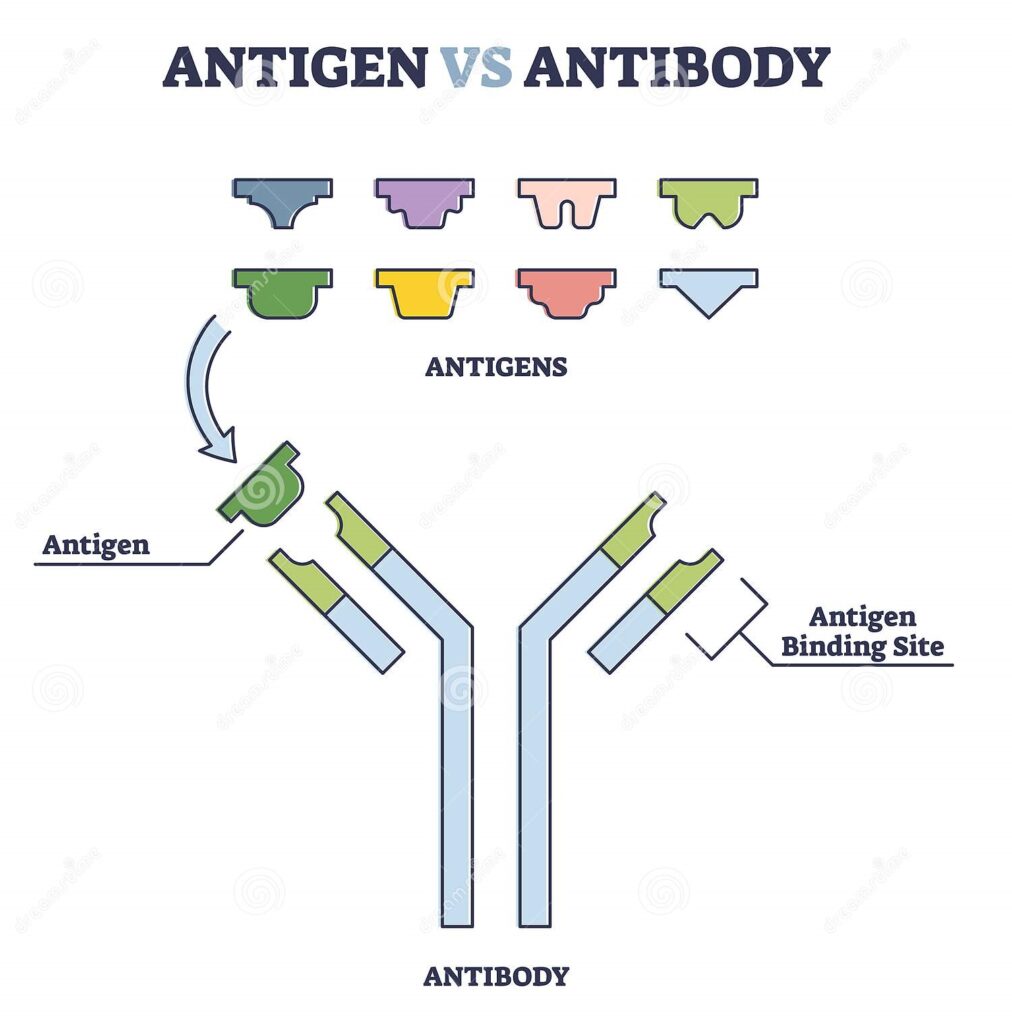Antigen and Antibody
An antigen is unwanted foreign substance that enters our body. Foreign substances can include bacteria, viruses, fungi, allergens, venom, and other various toxins and disease-causing organisms.
An antibody is a protein produced by our immune system to attack and fight off these antigens. Immunoglobulin is used as another word for antibody.

What is Antigen?
- An antigen is any molecule, foreign particulate matter, allergens, venom or disease causing organisms or various toxins that can bind to a specific antibody. The term antigen originally referred to a substance that is an antibody generator.
- The presence of antigens in the body may trigger an immune response.
- Antigens can be proteins, peptides (amino acid chains), polysaccharides (chains of simple sugars), lipids, or nucleic acids.
- Antigens are recognized by antigen receptors, including antibodies and T-cell receptors. Diverse antigen receptors are made by cells of the immune system so that each cell has a specificity for a single antigen.
- Classification: Based on their source, antigens can be exogenous, endogenous or autoantigens. Exogenous antigens are antigens that have entered the body from the outside, for example, by inhalation, ingestion or injection. Endogenous antigens are generated within normal cells as a result of normal cell metabolism, or because of viral or intracellular bacterial infection. An autoantigen is usually a self-protein or protein complex (and sometimes DNA or RNA) that is recognized by the immune system of patients with a specific autoimmune disease.
- Upon exposure to an antigen, only the lymphocytes that recognize that antigen are activated and expanded, a process known as clonal selection.
- Vaccines are examples of antigens in an immunogenic form, which are intentionally administered to a recipient to induce the memory function of the adaptive immune system towards antigens of the pathogen invading that recipient. The vaccine for seasonal influenza is a common example.
What is Antibody?
- These are protective proteins produced by our immune system. They attach to antigens (foreign substances) such as bacteria, fungi, viruses, and toxins and destroy them from our body.
- Location: Antibodies are found in our body including our skin, lungs, tears, saliva, and breast milk. Colostrum (a thick fluid secreted by the breasts for a few days after giving birth) is very good source of antibodies hence considered very good for baby’s immune system.
- Fight antigens: The molecules on the surfaces of antigens differ from those found naturally in our body. So, when an antigen enters our body, our immune system recognizes it, and calls out for antibody protection in order to attack on those antigens.
- Production of Antibodies: Antibodies are produced by B cells (specialized white blood cells). When an antigen meets a B cell, it causes the B cell to divide and clone. These cloned B cells or plasma cells release millions of antibodies into our bloodstream and lymph system.
- Paul Ehrlich coined the term antibody.
- Category: Based on location, Antibodies are categorized into five classes. Each one is labelled by a letter, which is attached to an abbreviation of the term “immunoglobulin” (Ig):
Antibody Type Function Location IgA IgA protects against ingested and inhaled pathogens. Found in saliva, tears, mucus, breast milk and intestinal fluid. IgD IgD supports B cell maturation and activation (exact function is not cleared yet). Surface of our B cells IgE IgE antibodies cause your mast cells (a type of white blood cell) to release histamine and other chemicals into your bloodstream. IgE antibodies are helpful for fighting off allergic reactions. Found mainly in the skin, lungs, and mucus membranes. IgG (most common antibody, making up approximately 70% to 75% of all immunoglobulins in our body) IgG antibodies help protect your body from viral and bacterial infections. Found mainly in blood and tissue fluids. IgM Act as the first line of defence against infections. Also play a large role in immune regulation. Blood and lymph system
See also…
Blood Types- Universal Donor and Recipients